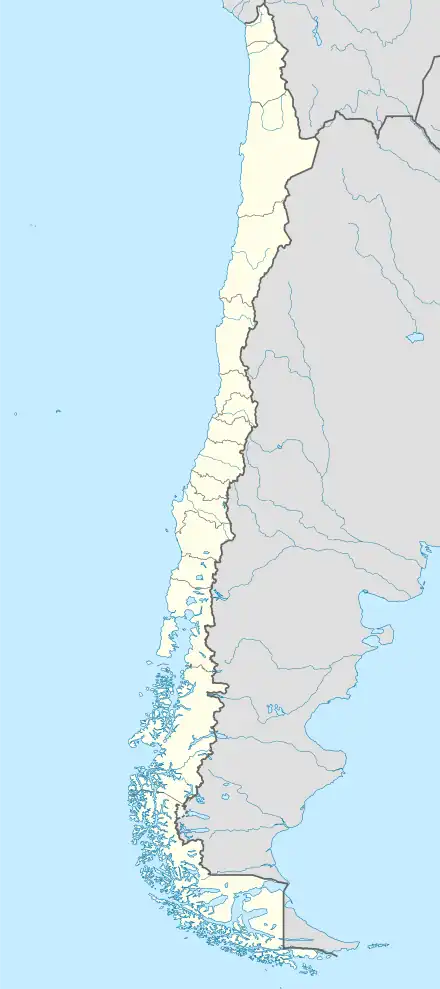El Tabo
El Tabo is a Chilean commune located in the San Antonio Province, Valparaíso Region. The commune spans an area of 98.8 km2 (38 sq mi).[2] This town is a traditional beach for middle class families.
El Tabo | |
|---|---|
|
  El Tabo Location in Chile | |
| Coordinates: 33°27′31″S 71°39′43″W | |
| Country | Chile |
| Region | Valparaíso |
| Province | San Antonio |
| Government | |
| • Type | Municipality |
| • Alcalde | Emilio Jorquera Romero (PPD) |
| Area | |
| • Total | 98.8 km2 (38.1 sq mi) |
| Elevation | 8 m (26 ft) |
| Population (2012 Census)[2] | |
| • Total | 8,161 |
| • Density | 83/km2 (210/sq mi) |
| • Urban | 6,604 |
| • Rural | 424 |
| Sex | |
| • Men | 3,537 |
| • Women | 3,491 |
| Time zone | UTC-4 (CLT[3]) |
| • Summer (DST) | UTC-3 (CLST[4]) |
| Area code | 56 + 35 |
| Website | www |
Demographics
According to the 2002 census of the National Statistics Institute, El Tabo has 7,028 inhabitants (3,537 men and 3,491 women). Of these, 6,604 (94%) lived in urban areas and 424 (6%) in rural areas. The population grew by 55.7% (2,515 persons) between the 1992 and 2002 censuses.[2]
Notable residents
- Nicanor Parra, poet (in Las Cruces area)
Administration
As a commune, El Tabo is a third-level administrative division of Chile administered by a municipal council, headed by an alcalde who is directly elected every four years. The 2008-2012 alcalde is Emilio Jorquera Romero (PPD). The council has the following members:[1]
- Edgardo Gómez Bravo (PPD)
- Fernando García Jofré (PDC)
- Osvaldo Román Arellano (UDI)
- Arturo Aravena Cisternas (RN)
- Richard Copier Garrido (PH)
- José Muñoz Osorio (PRSD)
Within the electoral divisions of Chile, El Tabo is represented in the Chamber of Deputies by María José Hoffmann (UDI) and Víctor Torres (PDC) as part of the 15th electoral district, (together with San Antonio, Santo Domingo, Cartagena, El Quisco, Algarrobo and Casablanca). The commune is represented in the Senate by Francisco Chahuán Chahuán (RN) and Ricardo Lagos Weber (PPD) as part of the 6th senatorial constituency (Valparaíso-Coast).
References
- "Municipality of El Tabo" (in Spanish). Retrieved 20 November 2010.
- "National Statistics Institute" (in Spanish). Retrieved 10 November 2010.
- "Chile Time". WorldTimeZones.org. Archived from the original on 2007-09-11. Retrieved 2010-07-28.
- "Chile Summer Time". WorldTimeZones.org. Archived from the original on 2007-09-11. Retrieved 2010-07-28.
External links
- (in Spanish) Municipality of El Tabo
